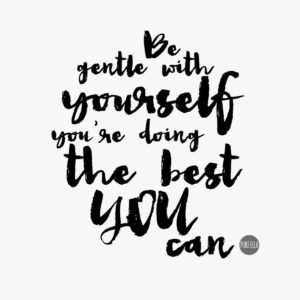My twelve-year-old self sunk into her chair and pretended to smile as her and her therapist discussed the different positive affirmations she could try. I remember those moments vividly. I’d come up with some brilliant line of bullshit and ensure my therapist that it truly made me feel hopeful. And then I’d return over the months with the same hateful thoughts and self-destructive behaviors.
For so long, I fell into the trope that coping skills and self-care only existed as positive affirmations, journaling, and bubble baths lit by scented candles. And sure, these are valid skills, but not the only ones, and not what’s best for everyone. Sadly, it wasn’t until recently that I realized this.
But this doesn’t have to be the case for everyone. You don’t have to spend your entire life constantly overwhelmed by the struggle with mental illness. So, in hopes of you not spending years trying to find solutions, I’m going to share some tips on how to find and utilize coping skills that work for you.
Before I share some tips, first I want to introduce a scale. This scale ranges from 1-10 and low intensity to high intensity emotions. If you’re at a “one” then you’re feeling pretty content with life and doing well overall. If you reach a “10,” which is ideally something we should all aim to avoid, then your safety and regulation are at immediate risk, and you need professional intervention. Personally, I usually sit around a 5. I’m not an incredibly happy person, but I also feel that I am doing well with my overall mental health. I’m just indifferent.
And while I’ve figured where my “normal,” is, it takes time to gauge what each number means for you, but once you do, this can be a helpful tool in identifying which coping skills are best for the situation. Personally, I feel there are two categories of coping skills: preventative and attentive. Preventative coping skills are ones that are used throughout the week to help you maintain a generally good headspace and a lower number on the scale. For example, maybe you know the upcoming week will be busier than usual, so to avoid burnout, you dedicate ten minutes a day to do something kind for yourself.
On the other hand, attentive skills are in response to an immediate stressful situation or when your number is higher on the scale. For example, maybe you’re having a panic attack and your thoughts feel like they’re spinning out of control. This will be when you jump into a freezing cold shower and shock your nervous system, so you don’t have the time to think of anything else but that shower. These coping skills are usually reserved for numbers 7-10.
Now, determining which skills are actually supportive of you takes practice and they can change over time. So, I encourage you try some of the following in a moment when you’re not incredibly stressed out to see if they’re effective. I would hate for you to wait until the last minute to see if these skills are effective or not and end up putting your well-being at risk.
Examples of Preventative Skills:
- Baking your favorite food or cooking your favorite meal
- Regular movement
- Snuggling an animal
- Spending time outdoors
- Grabbing your favorite coffee
- Journaling
- Talking to a friend
- Coloring
- Affirmations (ones that you actually believe)
Examples of Attentive Skills:
- Freezing showers
- Holding a frozen orange
- Grounding techniques (i.e. 54321 or candle breathing)
- Changing physical environment/ removing self from situation
- Opposite action (if you want to overexercise, choose to do something that respects your body instead)
- Reaching out to support systems
And while I hope you try, and enjoy, some of the coping skills listed above, I hope you know it takes time and practice to find ones that work effectively for you. Some days some well work better than others, and other days, not so much. Be patient with yourself, and, most importantly, do whatever you need to do to keep yourself safe!


